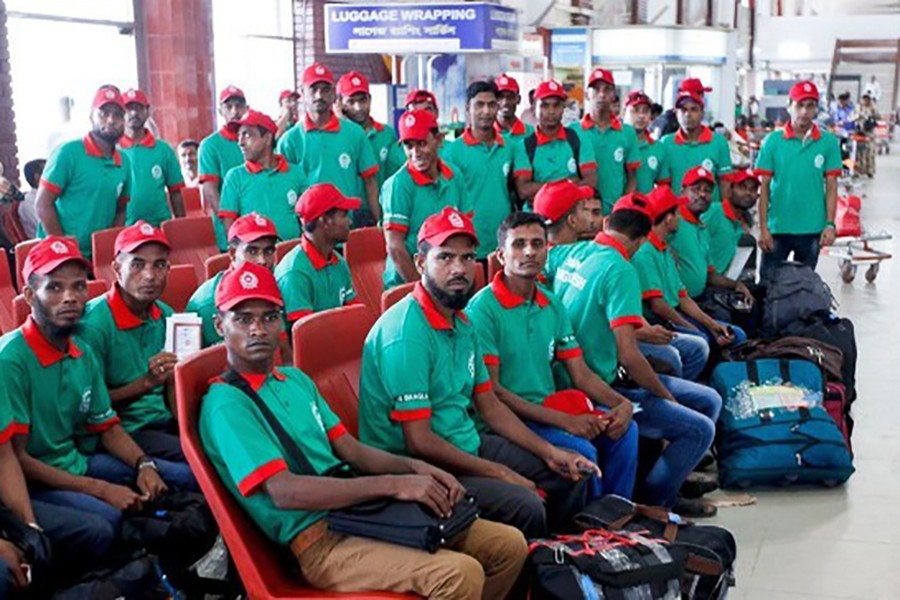The country's manpower export may experience further fall in the coming years due to poor demand for less-skilled workers in major markets, experts and sector insiders have predicted, calling for urgent measures to develop skilled manpower.
They suggested formulating a long-term policy with restructuring the education and training systems that would facilitate improving the workers' skills to a standard suitable for the job destinations.
They also recommended taking measures to diversify job markets.
The wage earners sent home US$15.53 billion in 2018. They contribute around 13 per cent to the country's gross domestic product (GDP), according to an estimate.
The demand for less- skilled workers is gradually falling in the global market while Middle East (ME) countries, the key market for Bangladeshi workers, reduced hiring foreign workers in the recent times, they said.
Overseas employments from Bangladesh fell more than 27 per cent in last year compared to that of the previous year.
A total of 734,181 workers went abroad in 2018 as compared to over 1.0 million in 2017, according to Bureau of Manpower Employment and Training (BMET) data.
Sector insiders said the fall was due to dependence on a single market, mainly Saudi Arabia.
The outflow of workers from Bangladesh to Saudi Arabia dropped by more than 53 per cent to 257,317 in 2018 as compared to 551,308 in 2017, the BMET data showed.
The oil-rich country banned 12 categories of jobs for foreign workers in early 2018, substantially shrinking the job opportunities there. Manpower recruitment by other ME countries also dropped substantially because of slow development works.
According to the BMET, Qatar recruited 76,560 workers from Bangladesh in 2018 followed by Oman with 72,504 workers and Kuwait 27,637 workers. The countries hired 82,012, 89,074 and 49,604 workers respectively in 2017.
Besides, Malaysia stopped hiring workers from Bangladesh in September last year due to an allegation of syndication and human trafficking in the recruitment process.
The Southeast Asian country recruited more than 175,927 workers from Bangladesh in 2018 and 99,787 in 2017.
Tasneem Siddiqui, founding chair at Refugee and Migrating Movements Research Unit (RMMRU), said it is hardly possible to keep stable the overseas employment growth in future without taking a long-term policy.
She said that vocational education should be mandatory in general education and training quality should be improved to keep smooth supply of workers to the international market.
"Otherwise, it is very difficult to maintain a stable growth of overseas employments in the coming days," she added.
So far, mainly less-skilled workers found jobs with their own initiatives. But now the government has to take the responsibility as it would not be possible to survive for a long time depending only on the less-skilled workers, she observed.
She, however, said the policy should be formed involving all the relevant ministries, especially education, as the current education system cannot help develop quality manpower.
The migration expert also said that at least five to six strong job markets should be made available for sending the workers.
Syed Saiful Haque, chairman of WARBE Development Foundation, said that dependence on traditional markets should be reduced if the country wants to increase the number of outbound workers.
Without market diversification and skills development, it would be a very tough job to maintain a higher trend of labour migration, he said.
A strong diplomatic initiative is also very crucial to protect the workers' rights. He also said that a section of the manpower recruiters put more emphasis on the free or individual visas than that of the company visas to increase the number of employments.
"It should be stopped as workers are being cheated and getting jobless in the ME countries because of such so called free visas," he added.
When contacted, Shameem Ahmed Chowdhury Noman, secretary general of Bangladesh Association of International Recruiting Agencies (BAIRA), also stressed the need for skills development of the workers so that the number of outbound workers could be increased.
The remittance inflow could be increased by several times than that of the present level through sending quality workers abroad, he mentioned.
Over 12 million Bangladeshis went to 168 countries since 1976. Of them, 80 per cent migrated to the ME states.


